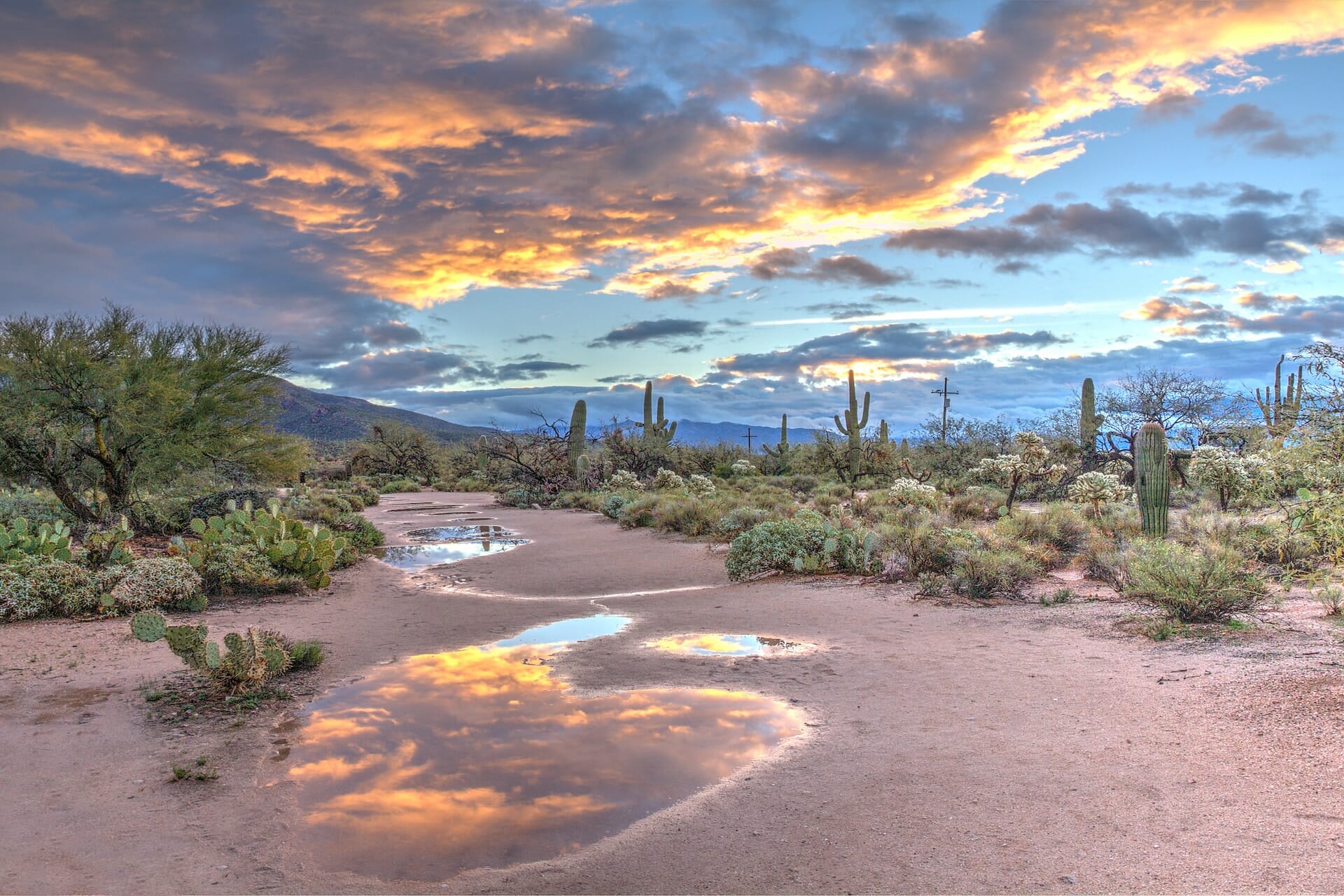
Arizona Food systems
Introduction
Being based in Arizona, it’s only natural that supporting our home state’s food system is a top priority for the Swette Center.
Arizona’s food system faces unique challenges due to the state’s arid climate and water scarcity. However, Arizona also presents opportunities for innovative approaches to promote sustainable food production and distribution. Sustainable agriculture practices, such as drip irrigation, precision farming and hydroponics, are being adopted to maximize water efficiency and minimize environmental impact. Additionally, the state’s diverse ecosystems and extensive Indigenous knowledge offer potential for climate-smart agriculture and the preservation of biodiversity. Community-supported agriculture (CSA) programs, farmers’ markets and urban agriculture initiatives are gaining popularity as they promote local food production, reduce food miles and support small-scale farmers. Efforts to increase access to fresh and healthy food in underserved areas, address food waste and support sustainable food businesses are also underway.

Organic attracts NextGen farmers and ranchers
A growing number of young and beginning farmers are committing to organic practices – organic seems to be a lure into American agriculture at a time when we need to repopulate our working lands. The 2017 Census of Agriculture reported that the average age of producers for all farms was 57.5 years, while that of organic farmers was 50.5 years. Perhaps more significantly, these organic farmers are much more likely to farm full time. This promising shift to organic farming is particularly important as farmers age out and a new generation produces the nation’s food.
Organic promotes American grown
US consumer demand for organic far outstrips supply. Given an insufficient domestic supply, many US companies have no choice but to import organic products. President Biden has emphasized the importance of American Made, issuing an Executive Order to promote rebuilding sectors that employ American workers. Organic should be a focus in this effort. Americans spend at least $2.2 billion annually on imported organic food according to the International Trade Commission. The USDA Foreign Agriculture Service assesses organic trade across the globe and has identified a key threat: India is looking to increase cropland to export to the US which could potentially eclipse domestic organic market opportunities, suggesting urgent action.
How does the Swette Center support Arizona food systems?

Urban Agriculture Research
The planet is urbanizing and with it, interest in urban agriculture is growing. Our Grow Local Tempe project, funded through a USDA Urban Agriculture and Innovative Production grant, is a partnership between the Swette Center and the City of Tempe in which we work with neighborhoods, schools and community organizations to strengthen a sustainable local food system to meet the needs of the Tempe’s growing population. Our research team conducted a state-of-play review of urban agriculture best practices through interviews with local urban growers. They also conducted case studies of six US cities for lessons that could apply to the city that is home to our main campus. This resulted in the development of 10 policy recommendations that were submitted for local residents’ feedback, and paved the way for the development of a Tempe food plan. The synthesis of this work has been compiled in a report to be published in early Fall 2023. Additionally, we worked with a group of graduate students to create and maintain a map referencing local food assets for urban agriculture in the city of Tempe. We are currently conducting a feasibility study to create an urban agriculture training and development certification program at Arizona State University.

Transition to Organic Partnership Program (TOPP)
As part of USDA’s $100 Million Dollar Transition to Organic Partnerships Program (TOPP), the ASU Swette Center for Sustainable Food Systems is serving as the state lead to support farmers across Arizona as they transition to organic farming systems. This is a nation-wide collaboration led by the National Organic Program that is building programs specifically designed for farmers transitioning to organic practices and includes farmer-to-farmer mentorship, technical assistance, workforce development and community building initiatives. This work is funded by a 5-year cooperative agreement overseen by the Western/Southwestern Regional Center for Organic Transition, housed at the non-profit organic certifier California Certified Organic Farmers (CCOF).
For more information, please visit our TOPP page, publication coming soon!

Climate-SMART Agriculture Pilot Project
The Climate-SMART (Specific Management for Arizona Resilience and Transformation) Agriculture pilot project is a state-wide collaboration to create a program for growers in Arizona to adopt climate-smart agriculture and forestry practices that will allow for abundant agriculture while conserving water, fostering healthy soil and mitigating climate change through ecosystem services and carbon sequestration. This project arose out of widespread concern about how Arizona has been particularly impacted by climate change, making climate-smart solutions in Arizona agriculture a necessary part of our state’s future.
Funded by USDA Partnerships for Climate-Smart Commodities, this project is being led by the Arizona Association of Conservation Districts (AACD) and involves 13 project partners across the state. The Swette Center has committed to creating training guides for the workshops by working with early adopters of climate-smart practices, providing technical support on biologicals and facilitating stakeholder engagement for the workshops.
This exciting project is set to commence in 2024 – stay tuned!

4th Annual Arizona Food Summit
Featuring 26 speakers and over 200 Arizonans in attendance – nearly 140 in person – the Arizona Department of Agriculture and ASU Swette Center for Sustainable Food Systems co-hosted the 4th annual Arizona Food Summit at ASU’s Sun Devil Stadium in 2022 for two days of information sharing and discussion on how best to move forward on creating a sustainable, healthy food system for all Arizonans.
The days were packed with speakers from across the food system spectrum. The event opened with US Secretary of Agriculture, Tom Vilsack emphasizing the need to link food security with nutrition security and to better translate science to help people make informed choices. Vilsack further challenged Arizonans to engage, bring young people into agriculture and food work, support our local farmers and attend to nutrition security.

Immersive visits and blog highlights
Each year, we take our graduate students across Arizona for an immersive food and farm experience to learn directly from farmers, ranchers, food processors, hunger relief workers, government officials and food entrepreneurs. They visit a USDA Animal & Plant Health Inspection facility in Yuma, where they scan batches of fresh greens for bugs, visit farmers in their fields, see flour being milled and participate in olive oil taste tests. They prepare food bags at United Food Bank, hear from school garden leaders, visit dairy farms and ranches and, during the drive, they listen to podcasts recorded for them by ASU faculty, Hopi and citrus farmers and Swette Center Senior Fellows.
The bottom-line lesson of the class: one should never design food policy absent conversations with the people who produce our food.
To encourage thoughtful reflection, students are assigned responsibility for writing a short article about one of the meetings during the immersive. These “blogs” are posted on the Swette Center website and shared via social media. Collectively, through these 35+ blogs, the students share with the public their new insight into Arizona’s food system and appreciation for all that it takes to put food on the table.
Related research projects
-

Arizona food systems
Introduction Being based in Arizona, it’s only natural that supporting our home state’s food system is a top priority for the Swette Center. Arizona’s food system faces unique challenges due to the state’s arid climate and water scarcity. However, Arizona also presents opportunities for innovative approaches to promote sustainable food production and distribution. Sustainable agriculture…
-
Engaging the private sector
Lorem ipsum dolor sit amet, consectetur adipiscing elit, sed do eiusmod tempor incididunt ut labore et dolore magna aliqua. Ut enim ad minim veniam, quis nostrud exercitation ullamco laboris nisi ut aliquip ex ea commodo consequat. Duis aute irure dolor in reprehenderit in voluptate velit esse cillum dolore eu fugiat.
-

Empowering indigenous foodways
Lorem ipsum dolor sit amet, consectetur adipiscing elit, sed do eiusmod tempor incididunt ut labore et dolore magna aliqua. Ut enim ad minim veniam, quis nostrud exercitation ullamco laboris nisi ut aliquip ex ea commodo consequat. Duis aute irure dolor in reprehenderit in voluptate velit esse cillum dolore eu fugiat.